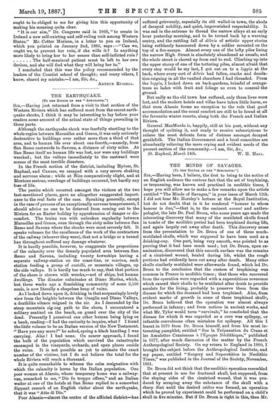THE EARTHQUAKE.
[TO TIM EDITOR or THE SPECTATO.."] BM—Having just returned from a visit to that section of the Western Riviera which has suffered most from the recent earth- quake shocks, I think it may be interesting to lay before your readers some account of the actual state of things prevailing in those parts.
Although the earthquake shock was fearfully startling to the whole region between Marseilles and Genoa, it was only seriously destructive to buildings over rather more than a third of that area, and to human life over about one.fourth,—namely, from Ban Remo eastwards to Savona, a distance of sixty miles. At San Remo itself no human life was lost, nor were any buildings -wrecked; but the valleys immediately to the eastward were scenes of the most terrible disasters.
In the French section of the district, including Hyeres, St. Raphael, and Cannes, we escaped with a very severe shaking and nervous alarm ; while at Nice comparatively slight, and at Menton° serious, wreckage of buildings occurred, but hardly any doss of life.
The panics which occurred amongst the visitors at the two last-mentioned places, gave an altogether exaggerated import- ance to the real facts of the case. Speaking generally, except in the case of persons of an exceptionally nervous temperament, I should advise no one to be deterred from coming out to the Riviera for an Easter holiday by apprehension of danger or dis- comfort The trains ran with unbroken regularity between Marseilles and Genoa, even through the sixty miles between San Remo and Savona where the shocks were most severely felt. It speaks volumes for the excellence of the work of the contractors of the railway (whoever they were), that not a bridge or a tunnel has throughout suffered any damage whatever.
It is hardly possible, however, to exaggerate the proportions of the calamity over the densely populated area between San Remo and Savona, including twenty townships having a separate railway-station on the coast-line, or marina, each station feeding a group of castelli, or mountain villages, up the side valleys. It is hardly too much to say, that that portion -of the shore is strewn with wrecks,—not of ships, but human dwellings. The disaster culminates at Diane Marina, which, but three weeks ago a flourishing community of some 2,500 souls, is now literally a shapeless heap of ruins.
As I looked down upon it, drinking in that surpassingly lovely view from the heights between the Oneglia and Diano Valleys, a deathlike silence reigned in the air. As I descended by the steep mountain zig-zag path to the shore, I encountered a solitary sentinel on the beach, on guard over the city of the dead. Presently I perceived one other human being lying on a bank, reading—I had the curiosity to inquire, what ? I found the little volume to be an Italian version of the New Testament. '" Have you any more P" he asked, eyeing a black handbag I was carrying. Alas ! I had none. On nearer approach, I found the bulk of the population which survived the catastrophe encamped in the vineyards, orchards, and open places onside the ruins. It is not possible as yet to estimate the exact number of the victims, but I do not believe the total for the whole Riviera will reach a thousand..
It is quite remarkable to witness the calm resignation with which the calamity is borne by the Italian population. One poor woman at Alaseio, whose temporary home was a railway. van, remarked to me, "Din in troppo offeso," and an Italian waiter at one of the hotels at San Remo replied to a somewhat flippant remark of an English visitor about the earthquake, that it was " Atto di Dio."
Poor Alassio—almost the centre of the afflicted district—has suffered grievously, especially its old walled-in town, the abode of decayed nobility, and quiet, impoverished respectability. It was sad in the extreme to thread the narrow alleys at an early hour yesterday morning, and to be turned hack by a warning sentry, and the rattling fall of debris of artistic upper stories being ruthlessly hammered down by a soldier mounted on the top of a fire-escape. Almost every one of the lofty piles lining the narrow High Street is absolutely abandoned as unsafe, and the whole street is shored up from end to end. Climbing up into the upper storey of one of the tottering piles, almost afraid that every step would be my last, I got out on to a loggia at the back, where every sort of debris had fallen, cracks and desola- tion reigning in all the vaulted. chambers I had threaded. From the loggia, I looked down on back-gardens, brimful of orange- trees so laden with fruit and foliage as even to conceal the ground.
But sadly as the old town has suffered, only three lives were lost, and the modern hotels and villas have taken little harm, so that even Akashi forma no exception to the rule that good accommodation and the usual comfort are still to be found at all the favourite winter resorts, along both the French and Italian Riviera.
General Machfurdo is, happily, still at his post, without any thought of quitting it, and ready to receive subscriptions to relieve the most delicate form of distress amongst decayed gentlefolk. The Italian Government and a local committee are abundantly relieving the more crying and evident needs of the poorest section of the community.—I am, Sir, Sce.,


































 Previous page
Previous page